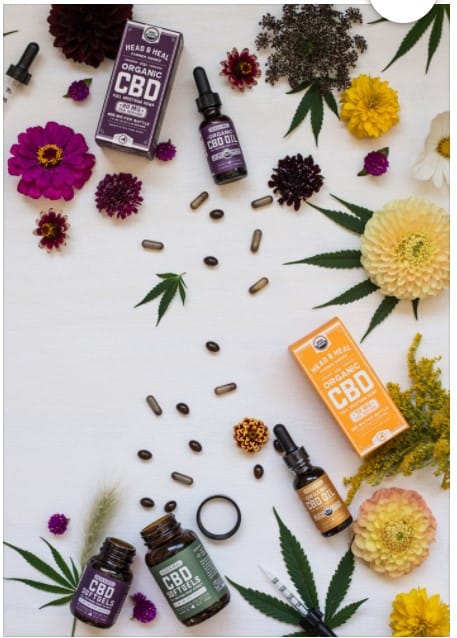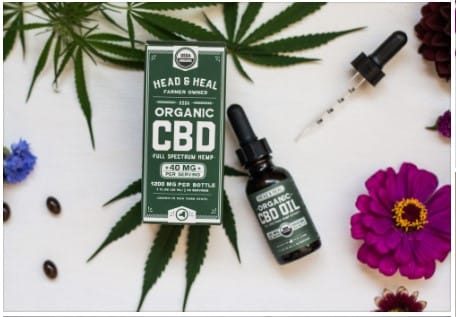With the growing popularity of CBD products like CBD oils, people like yourself are getting curious and starting to do some research on how to best incorporate this 21st century solution into daily life.
Many options indeed exist when it comes to CBD products, but the two most popular delivery formats remain CBD oil tinctures and CBD capsules. So which is right for you? In this article, we’ll arm you with the knowledge to better understand CBD products and then walk you through that decision-making process.
Let’s get started!
What Is CBD, and Where Does It Come from?
CBD, or cannabidiol, is a unique molecule called a cannabinoid. Cannabinoids are found in Cannabis sativa.
Wait… CBD-dominant? What does that mean?
Well, CBD isn’t the only cannabinoid in town. There are actually over a hundred of these fantastic tiny molecules. But CBD remains one of the most abundant. And so, when a hemp plant produces more CBD than any other cannabinoid, we call it CBD-dominant.
Going back to that “special molecule” thing we mentioned… What makes cannabinoids unique?
They can connect to little receptors in your body that are part of something called an endocannabinoid system (ECS).
If this sounds new to you, don’t worry. Researchers only discovered the ECS in 1992!
What’s important to know is that when CBD enters your body, it can have little chats with two kinds of receptors (called CB1 and CB2 receptors) in your ECS, and this may have positive effects for different people.
According to a poll done by Gallup, one in seven Americans has now used a CBD product – with pain, anxiety and sleep/insomnia being the top three reasons why.

A Note on Full Spectrum, Broad Spectrum and Isolate
You might’ve heard these terms before. But if not, they’re essential to learn when navigating the land of CBD products.
Full-spectrum CBD will be an extract that keeps all the beneficial cannabinoids and other compounds, like terpenes, present in hemp. Yes, this does include THC (that’s the psychoactive one), but by law will have a maximum of 0.3 percent, which, trust us, is really small.
Broad spectrum CBD is going to be similar to full, minus the THC.
And then you have CBD isolate, which is pure CBD with nothing else along for the ride. No THC, but also no other cannabinoids or beneficial compounds.
Some folks prefer keeping things as unrefined as possible due to something called the “entourage effect,” which claims CBD has a better synergistic effect when it works with its fellow cannabinoid teammates. Some people however, for a variety of different reasons like sensitivities to terpenes and cannabinoids, may want extracts that are more refined and isolated.

Source: Head & Heal
What Is CBD Oil?
CBD oil is the most popular CBD product on the market, and many varieties exist.
Generally speaking, a CBD oil will combine full spectrum CBD, broad spectrum CBD or CBD isolate with a carrier oil to form a CBD tincture. Popular carrier oils include hemp seed oil and MCT oil, but you’ll find it added to olive oil, avocado oil and others as well.
CBD oil also comes in a variety of concentrations. Often starting as low as 5 mg or 10 mg per serving, they go up to potency levels of around 80 mg.
Check the packaging for the CBD Potency by milligram, which should be listed on the bottle of your products.. The big one will be how much is in the bottle, while the lower one will indicate the per-serving concentration. The average dropper is a single serving, and many come with lines that allow you to precisely dose and adjust amounts.
Most folks take CBD oil sublingually (under the tongue) because this is an efficient and quick way to get it into your system. It can also be ingested by adding it to beverages such as coffee or even cocktails or used in foods like salad dressings, although keep in mind, this is an oil based tincture, so it may need to be mixed well with liquids to be incorporated.
Tips for Choosing CBD Oil
You’ll want to make sure that the company you’re buying from is reputable and makes their third-party lab test results available on their website.
These are important, as they show you the CBD amount in each product and other cannabinoids. The products are also tested for contaminants like pesticides and other harmful agents because no one wants that in their body!
After that, check out the concentration of CBD in the oil. If you’re just starting out, look for something that’s 10 mg to 20 mg per serving. More advanced folks can jump in with 40 mg or 80 mg.
Lastly, check to see if the oil you’re buying is flavored. Unflavored CBD oil is often described as being earthy, nutty or grass-like. Since that’s not everyone’s jam, some companies have come out with various flavored CBD oils. Some of the concoctions can be a little wild themselves, so carefully read when choosing which one you want.

Source: Head & Heal
What Are CBD Softgels and Capsules?
You can think of CBD capsules and softgels as CBD oil on the go. Usually, they contain full spectrum, broad spectrum or isolate versions of CBD with a carrier oil. Sounding pretty familiar, huh?
They do differ from CBD oil in a few ways, though.
Since they’re in softgel or capsule form, the amount of CBD per serving is locked in. You may find products with anywhere from 10 mg to 40 mg of CBD in each one, but we’ve found 20 mg tends to be popular. That’s probably because it’s easy to get a good amount from a single dose and it works well for upping the amount you take each day when you’re ready.
Something to consider if you’re vegetarian or vegan; softgels are not all free of animal products, so read the label carefully.
That brings us to the last point. When you take capsules and softgels, you’re ingesting them. Any time you’re ingesting CBD, it will have to make its way through your digestive system. Unless you’ve found slow-release capsules that will release the CBD in your intestines versus stomach, you’re going to have lower bioavailability, meaning you might need to take more. And regardless, it will take longer to feel the effects.
Tips for Choosing CBD Capsules and Softgels
Much like with CBD oil, you’re going to want to check out the company’s third-party lab results for the specific product you’re buying. There should be batch numbers to connect the particular bottle of capsules you’re looking at with. No certificates of analysis available? Move along and find another vendor!
You’ll also want to think about what size or quantity you wish to buy. Typically, larger bottles with more product inside are going to give you a lower per-capsule cost. But of course, the sticker price will be higher as well. That’s a personal budget decision.
And always take note of the concentration inside each softgel or capsule. You want to make sure you’re purchasing something appropriate for your routine.
Which Is the Right Choice for You?
CBD oil tends to be most popular with people who incorporate CBD in their daily routines and are not likely to forget about it. A quick squirt from the dropper, and it’s done. CBD oil is can be great for people looking to add CBD to drinks or food as they experiment in the kitchen. Lastly, CBD oil is good for people who want a high concentration and bioavailability as the most potent products are generally oils.
CBD capsules and softgels are exceedingly popular with folks looking for something portable to take with them anywhere. And yes, you can even fly domestically with CBD products. They’re also nice if your routine isn’t the same every day and has the potential to change. This way, if you forget breakfast because you didn’t get one thanks to a 7 a.m. meeting, you’re covered at lunch. And of course, capsules are just a whole lot more discreet and can quickly be taken anywhere.
But if you can’t decide which is best for you, try both. Just keep track of how much CBD you’re taking daily and pay attention to how you’re feeling as you go along.

